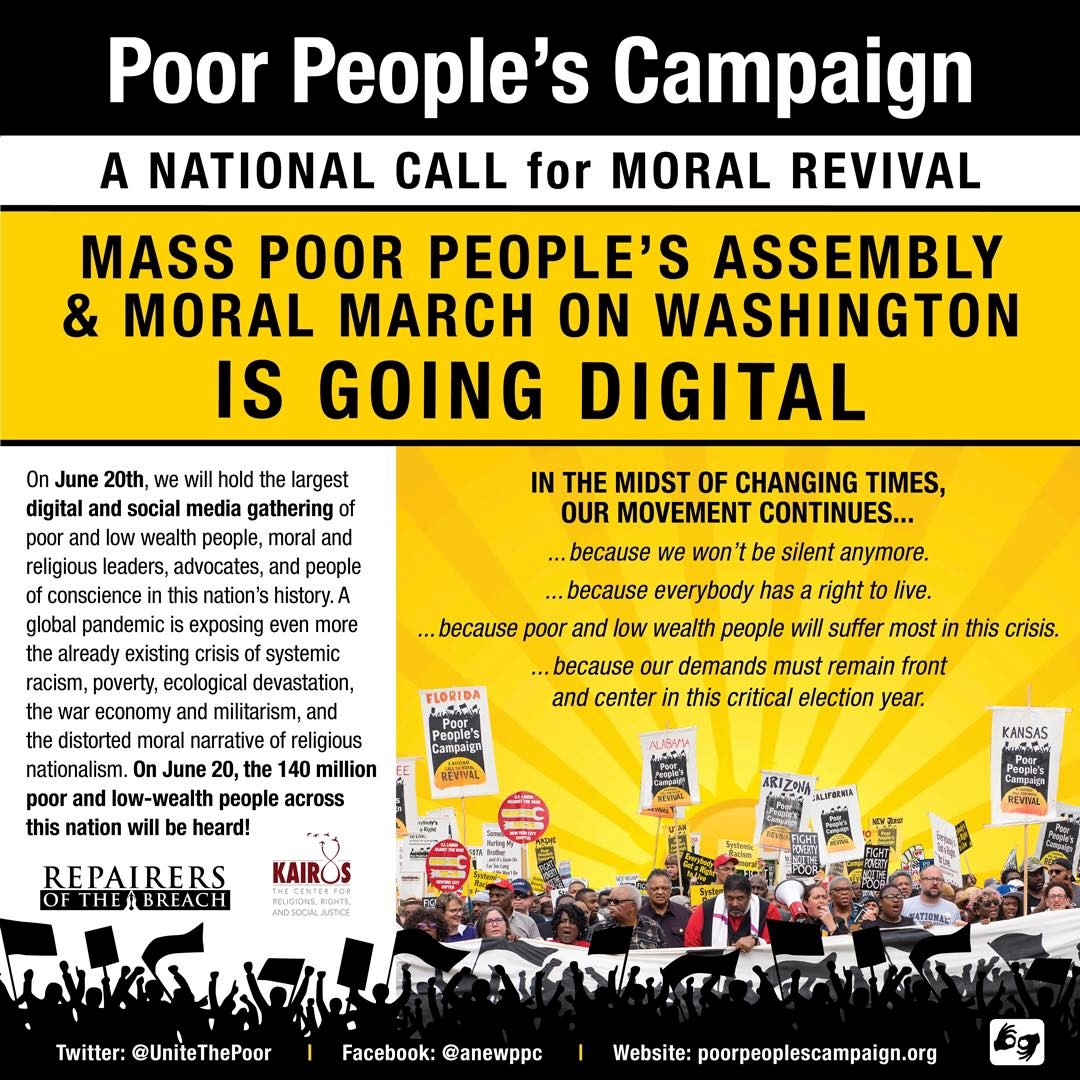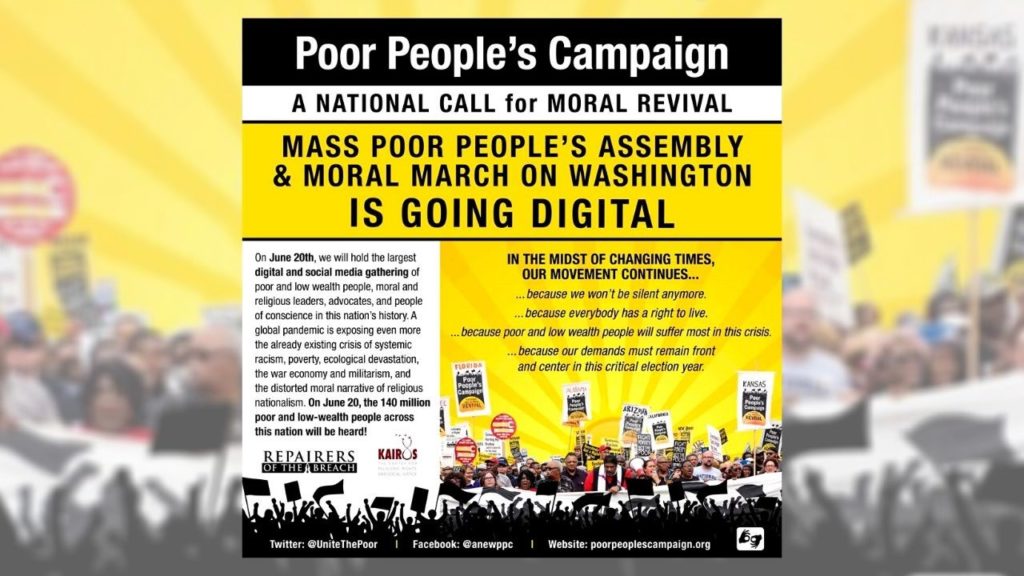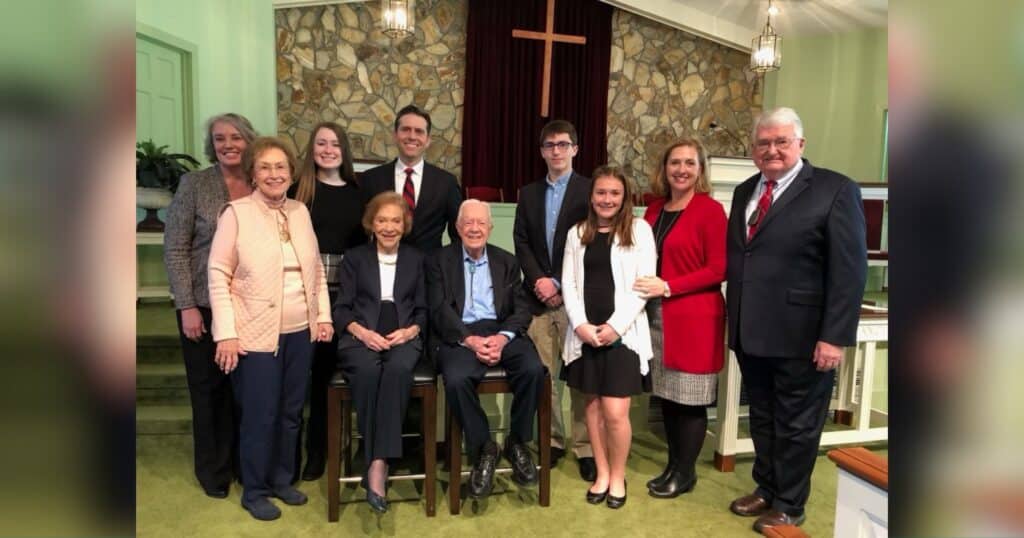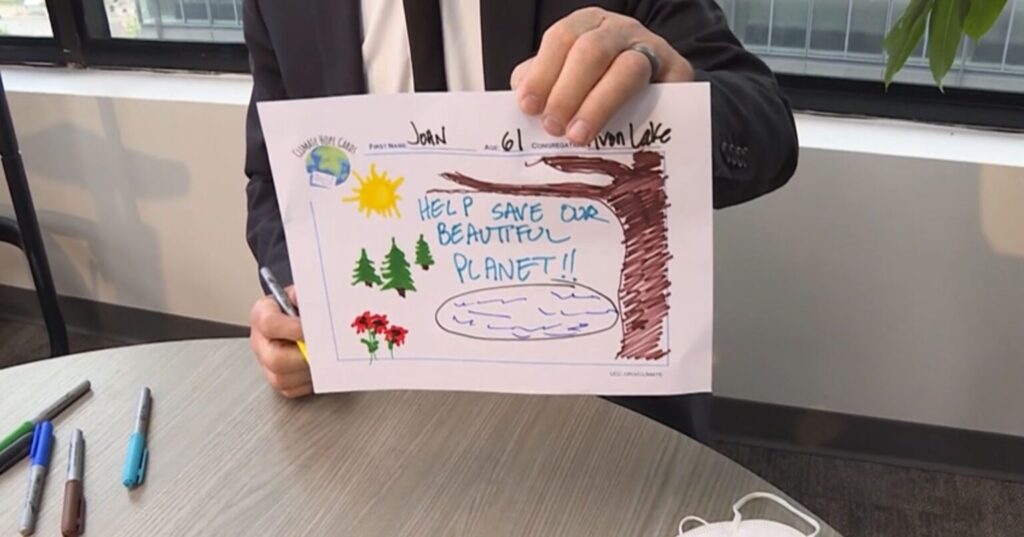‘Stories, songs, solutions’ will highlight Poor People’s Campaign online event June 20
The speakers in a June 9 United Church of Christ webinar said they get that some Christians feel sad and frozen in the face of today’s police violence, coronavirus and other problems – but then offered them a way to turn those emotions into action.
 “Start right there in the sadness and the mourning,” said the Rev. William Barber, the Christian Church (Disciples of Christ) pastor who co-leads the national Poor People’s Campaign. Quoting scriptures that validate those feelings, he urged listeners: “Don’t try to get comforted. Don’t try to be okay … If you’re sad, if you’re mourning, that’s where you ought to be.”
“Start right there in the sadness and the mourning,” said the Rev. William Barber, the Christian Church (Disciples of Christ) pastor who co-leads the national Poor People’s Campaign. Quoting scriptures that validate those feelings, he urged listeners: “Don’t try to get comforted. Don’t try to be okay … If you’re sad, if you’re mourning, that’s where you ought to be.”
Then, “hook up with a movement that is willing to mourn, to march, to move and to fight for a new mandate and the transformation of this world,” he said.
That is what the Poor People’s campaign is about, Barber said, and it is pressing ahead despite the COVID-19 pandemic. Its planned mass assembly in the nation’s capital on Saturday, June 20, has moved online. People can register here.
Participants in the “digital justice gathering” on June 20 can expect “stories, songs and solutions,” said Barber’s Presbyterian co-chair, the Rev. Liz Theoharis. The event will include much of the same inspirational and motivational content planned for the in-person march and assembly, featuring voices of actual poor people – and specific strategies that people can act upon.
Barber and Theoharis were two of the speakers in the June 9 webinar, “The Urgency of Now,” recorded as part of the UCC’s “Tuesdays for Nurture” series. It can be viewed here.
‘Start with who wants to be involved’
To attack the interlocking problems of racism, poverty, health care, education, public spending priorities and more, “You start with who wants to be involved,” Theoharis said. “And that is not a small number.”
The Rev. Traci Blackmon, UCC associate general minister and host of the June 9 webinar, said she hopes everyone in the UCC will be in that number on June 20 – starting with all 20,000 of the denomination’s Justice and Peace Action Network subscribers, who will be prompted to register.
Barber said life and death are at stake in making social change now, whether in reaction to the police killing of George Floyd, the 100,000 deaths from COVID-19, or the pattern of poverty and death that predated both. “What you have is this compounded death, like a concussion that comes from being hit over and over and over again,” he said.
“Accepting death is no longer an option,” Barber said. “Right now what we’re seeing with all this mourning and crying and protesting is people who still have a little hope that things can change. … But God help us if we don’t address what I’m now calling the DM – the death measurement – of every piece of public policy.” He said social ills that should count toward that measurement include voter suppression, ecological destruction, denial of health care and living wages, and more.
‘Shift the narrative and build power’
The campaign’s goals are to “shift the narrative and build power,” Theoharis said – including countering what she called “this lie of scarcity.” As examples, she mentioned police being fully outfitted while nurses and doctors lack Personal Protective Equipment, and rich corporations receiving COVID bailouts while “politicians say this isn’t a time to expand health care.” “We’re being fed, and biting on, this lie that this is about as good as it gets,” she said. “To change all of that, you have to build power amongst the people.”
The confluence of the coronavirus pandemic and highly publicized police and vigilante killings offers an opportunity to build power, said Sandy Sorensen, who heads the UCC advocacy office in Washington, D.C. She said society is “seeing the intersections.” “COVID 19 has to do with public transportation and health care and a living wage and the lack of child care. And we saw it in George Floyd’s life – the intersection of COVID and police militarization and violence and racism and the unattainability of a living wage. And so I feel like we have an opportunity to press into these intersections in exciting ways, and I think that faith communities are uniquely poised to do that.” Taking action at intersections “speaks to the heart of who we are as the UCC,” she said.
The campaign’s way of building power is “counterintuitive,” Barber said, because it features people not usually heard from and refuses to divide them along usual lines. The examples he gave included white farmers from places with high suicide rates working with Black people from the Mississippi Delta; white mothers and Black mothers “who’ve had children die from lack of health care, saying, ‘We won’t be divided anymore.’”
During the June 20 gathering, Barber said, “you’re going to hear poor and low-income people from every race, creed and color. You’re going to see coal miners from Kentucky standing with Black folk from Alabama, laying out their stories, testifying, telling the pain prior to COVID and during COVID, but then laying out an agenda, and making a commitment to stay with it.” Voter registration and answering the U.S. Census are just two actions that will be available that day, he said.
Voting, census and a ‘moral budget’
Voting – and otherwise speaking out politically, from a faith perspective – really can matter, Sorensen said, noting that staff members on Capitol Hill count every phone call and message, and notice when they come from people of faith. “One thing we really need to do is be more bold in proclaiming our identity as people of faith when we’re doing advocacy,” she said. She mentioned the UCC’s Justice and Peace Action Network and Our Faith, Our Vote program as two channels to do that.
The Poor People’s Campaign is nonpartisan, with critiques for each major U.S. political party, Barber said. “Both parties are trapped by a neoliberalism imagination, which makes them think if you fix the middle class everything will be all right, or if you fix the top, everything will be all right,” he said. “Democrats run from poverty. Republicans racialize poverty. We have to have a moral movement that forces people to address it.”
The campaign has formulated a Poor People’s Moral Budget and a “bold, visionary set of demands,” Theoharis said. “We’re not just cursing the darkness. We for sure need to bring the darkness to the light so that folk are aware. But we actually need to push forward light and hope and possibility.”
“Societies change when people build powerful movements well,” she said. “You make it so by organizing, organizing, organizing; educating, educating, educating. It’s slow work. It’s tedious work. It’s not flashy. It doesn’t all happen overnight. But then sometimes it does. And we have to be ready to make that change overnight. And then when we win that change, we have to keep organizing to win more.”
Related News
Waging Peace: UCC pastor who served in Carter’s administration remembers the President
As thousands gathered to honor the life of Former President Jimmy Carter at the Washington...
Read MoreGoing deeper in 2025: Programs, projects, plans from UCC National Ministries
If there was a phrase capturing best what 2025 holds for the ministry teams of the National...
Read More‘Planting Seeds of Hope’ is this year’s Climate Hope Contest theme — Submissions open early February
Details about this year's Climate Hope Art Contest were announced at the first United Church...
Read More


